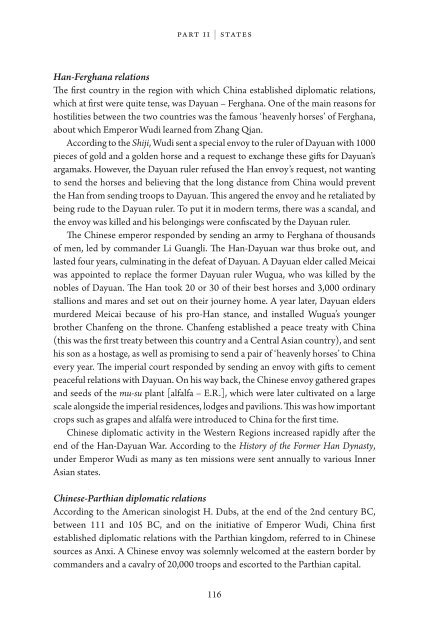You also want an ePaper? Increase the reach of your titles
YUMPU automatically turns print PDFs into web optimized ePapers that Google loves.
part ii | states<br />
Han-Ferghana relations<br />
The first country in the region with which China established diplomatic relations,<br />
which at first were quite tense, was Dayuan – Ferghana. One <strong>of</strong> the main reasons for<br />
hostilities between the two countries was the famous ‘heavenly horses’ <strong>of</strong> Ferghana,<br />
about which Emperor Wudi learned from Zhang Qian.<br />
According to the Shiji, Wudi sent a special envoy to the ruler <strong>of</strong> Dayuan with 1000<br />
pieces <strong>of</strong> gold and a golden horse and a request to exchange these gifts for Dayuan’s<br />
argamaks. However, the Dayuan ruler refused the Han envoy’s request, not wanting<br />
to send the horses and believing that the long distance from China would prevent<br />
the Han from sending troops to Dayuan. This angered the envoy and he retaliated by<br />
being rude to the Dayuan ruler. To put it in modern terms, there was a scandal, and<br />
the envoy was killed and his belongings were confiscated by the Dayuan ruler.<br />
The Chinese emperor responded by sending an army to Ferghana <strong>of</strong> thousands<br />
<strong>of</strong> men, led by commander Li Guangli. The Han-Dayuan war thus broke out, and<br />
lasted four years, culminating in the defeat <strong>of</strong> Dayuan. A Dayuan elder called Meicai<br />
was appointed to replace the former Dayuan ruler Wugua, who was killed by the<br />
nobles <strong>of</strong> Dayuan. The Han took 20 or 30 <strong>of</strong> their best horses and 3,000 ordinary<br />
stallions and mares and set out on their journey home. A year later, Dayuan elders<br />
murdered Meicai because <strong>of</strong> his pro-Han stance, and installed Wugua’s younger<br />
brother Chanfeng on the throne. Chanfeng established a peace treaty with China<br />
(this was the first treaty between this country and a Central <strong>Asia</strong>n country), and sent<br />
his son as a hostage, as well as promising to send a pair <strong>of</strong> ‘heavenly horses’ to China<br />
every year. The imperial court responded by sending an envoy with gifts to cement<br />
peaceful relations with Dayuan. On his way back, the Chinese envoy gathered grapes<br />
and seeds <strong>of</strong> the mu-su plant [alfalfa – E.R.], which were later cultivated on a large<br />
scale alongside the imperial residences, lodges and pavilions. This was how important<br />
crops such as grapes and alfalfa were introduced to China for the first time.<br />
Chinese diplomatic activity in the Western Regions increased rapidly after the<br />
end <strong>of</strong> the Han-Dayuan War. According to the History <strong>of</strong> the Former Han Dynasty,<br />
under Emperor Wudi as many as ten missions were sent annually to various Inner<br />
<strong>Asia</strong>n states.<br />
Chinese-Parthian diplomatic relations<br />
According to the American sinologist H. Dubs, at the end <strong>of</strong> the 2nd century BC,<br />
between 111 and 105 BC, and on the initiative <strong>of</strong> Emperor Wudi, China first<br />
established diplomatic relations with the Parthian kingdom, referred to in Chinese<br />
sources as Anxi. A Chinese envoy was solemnly welcomed at the eastern border by<br />
commanders and a cavalry <strong>of</strong> 20,000 troops and escorted to the Parthian capital.<br />
116


